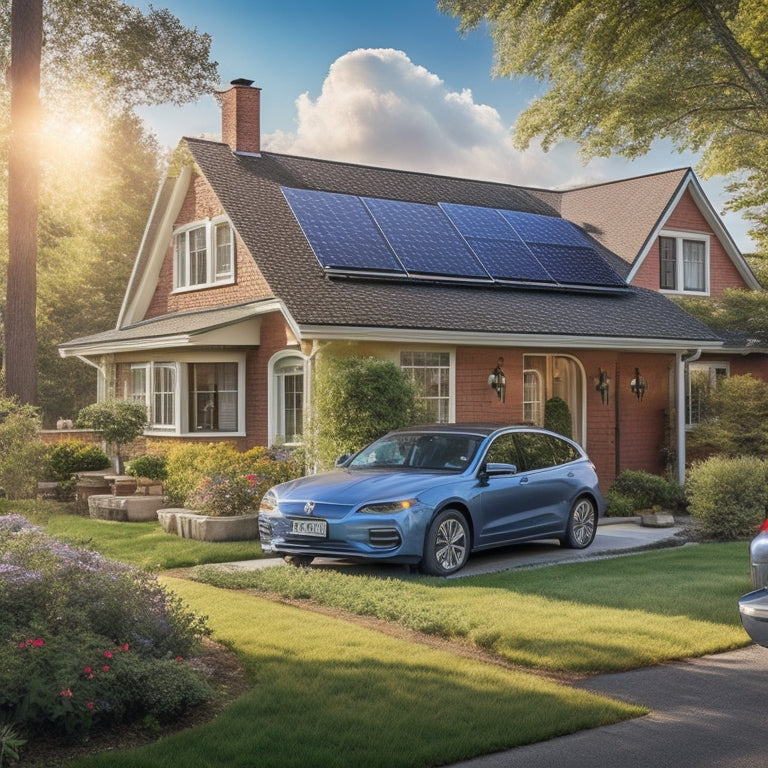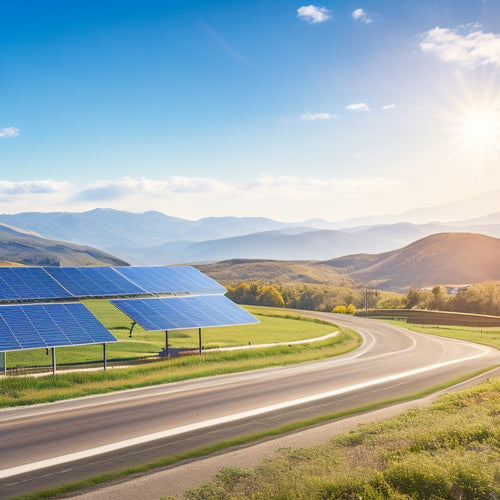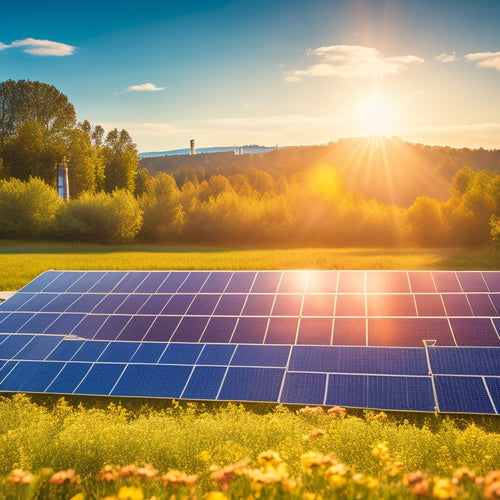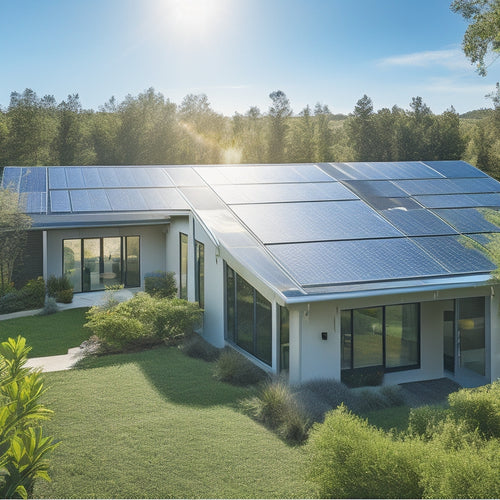
Successfully Integrating Renewable Energy Into Your Home
Share
Successfully integrating renewable energy into your home can change your energy experience. Start by evaluating your energy needs to choose the right systems, such as solar panels or energy storage solutions. These technologies can cut your utility bills by up to 100% and promote financial independence. Regular maintenance is easy, reducing long-term operational costs. Additionally, you'll lessen your carbon footprint, contributing positively to the environment. With various financing options and incentives available, this shift becomes more affordable. Investigate how these solutions can enhance your lifestyle and support a sustainable future.
At a Glance
- Conduct an energy audit to assess consumption patterns and identify areas for improvement before integrating renewable energy systems.
- Evaluate your home's energy needs and select appropriate renewable technologies like solar panels or wind turbines based on load analysis.
- Consider financing options such as low-interest loans, leases, and available tax incentives to offset initial investment costs.
- Utilize smart energy management systems to optimize real-time energy consumption and enhance overall efficiency in your home.
- Regularly maintain renewable systems to ensure longevity and efficiency, resulting in lower operational expenses and reduced environmental impact.
Cost-Effective Long-Term Savings
When considering renewable energy for your home, it's crucial to evaluate the initial investment and how it translates into long-term savings.
Solar power grids can reduce utility costs by 50% to 100%, making them an attractive option for homeowners. By reducing your energy bills over time, you can offset that upfront cost and see significant financial benefits.
Making this change not only enhances your home's efficiency but also contributes to a more sustainable future, promoting environmental health through financial benefits of solar power.
Initial Investment Considerations
Investing in renewable energy for your home can seem intimidating at first, but understanding the long-term savings can make it a more appealing decision.
The initial investment often deters homeowners, yet it's essential to view this as a strategic move toward financial freedom. Many financing options are available to help you manage upfront costs, such as low-interest loans or leases that allow you to install systems without large initial payments.
Additionally, don't overlook the impact of tax incentives. Many governments offer tax credits and rebates for renewable energy installations, greatly reducing your overall expenditure.
These incentives can make the shift more affordable and accelerate your return on investment.
Energy Bill Reductions
As you integrate renewable energy systems into your home, you'll likely notice a significant drop in your monthly energy bills. This reduction isn't just a temporary relief; it's a long-term financial alteration. By utilizing solar panels, wind turbines, or geothermal systems, you generate your own energy, reducing reliance on costly utility sources.
To maximize these savings, consider conducting energy audits. These assessments identify areas where you can enhance efficiency, further lowering your consumption. You'll uncover where insulation improvements or energy-efficient appliances can complement your renewable systems, amplifying your savings.
Moreover, take advantage of utility incentives designed to encourage renewable energy adoption. Many states offer rebates, tax credits, and other financial benefits that can offset your initial investment, making the shift even more cost-effective. By capitalizing on these programs, you're not just saving on bills; you're investing in your home's future.
In essence, integrating renewable energy enables you to take control of your energy expenses, clearing the path for financial independence. Seize this opportunity to enjoy significant savings while contributing to a more sustainable world.
Environmental Impact Reduction
By integrating renewable energy into your home, you can greatly minimize your carbon footprint and contribute to a healthier planet.
Utilizing sustainable energy sources not only reduces greenhouse gas emissions but also promotes energy independence.
Additionally, adopting solar power can lead to long-term savings on energy bills, enhancing your financial stability while considerably reducing installation costs.
Embracing these changes is a proactive step towards a more environmentally friendly lifestyle.
Carbon Footprint Minimization
Minimizing your carbon footprint is essential for reducing environmental impact and promoting a sustainable future. By taking proactive steps, you can greatly lower your emissions and adopt a greener lifestyle.
Start with an energy audit, which will help you identify areas where your home is wasting energy. This process reveals opportunities for improvement, like upgrading insulation or swapping out inefficient appliances.
Utilizing renewable incentives can further enhance your efforts. Many governments offer financial benefits for installing renewable energy systems, such as solar panels or wind turbines. These incentives not only reduce your installation costs but also encourage a shift to clean energy sources, decreasing your reliance on fossil fuels.
Additionally, consider adopting energy-efficient habits in your daily life. Simple changes, like using LED lighting or setting your thermostat wisely, contribute to carbon footprint reduction without sacrificing comfort.
Sustainable Energy Sources
Employing sustainable energy sources can greatly lessen your home's environmental impact while saving you money in the long run. By leveraging wind energy, installing solar panels, or employing geothermal heating, you can considerably lower your reliance on fossil fuels. Biomass energy and hydropower systems also provide viable options to generate clean energy.
To guarantee you're making the right choices, conduct energy audits to identify how to improve efficiency. This process can help you take advantage of renewable incentives that can offset installation costs. Grid integration allows you to connect your home to community solar projects, giving you access to shared renewable energy resources.
Consider incorporating passive design principles into your home, which can reduce energy needs by optimizing natural light and ventilation.
Here's a quick comparison of your sustainable energy options:
| Energy Source | Benefits |
|---|---|
| Wind Energy | Cost-effective, scalable |
| Solar Panels | Reduces electricity bills |
| Geothermal Heating | Efficient heating solution |
| Biomass Energy | Makes use of waste materials |
Adopting these strategies enables you to contribute to a cleaner environment while enjoying the freedom that comes with energy independence.
Technology and Efficiency Insights
To maximize your renewable energy usage, consider implementing smart energy management systems that optimize your energy consumption in real-time.
Integrating energy storage systems can bridge generation and consumption gaps, guaranteeing a stable energy supply.
Pairing these systems with effective energy storage solutions guarantees you can store excess energy for use during peak times or outages.
Smart Energy Management Systems
Smart Energy Management Systems (SEMS) frequently play an essential role in optimizing energy consumption in your home. With their ability to harness smart grid technology and IoT integration, SEMS enhance your energy efficiency and enable you to take control of your energy use. These systems employ real-time monitoring and energy analytics, enabling you to understand your consumption patterns and make informed decisions.
| Feature | Benefits | Applications |
|---|---|---|
| Demand Response | Reduces costs during peak hours | Utility incentives |
| Automated Controls | Enhances convenience | Smart appliances management |
| Predictive Maintenance | Prevents system failures | Regular system health checks |
| Load Management | Balances energy supply | Efficient energy distribution |
Energy Storage Solutions
As you investigate ways to enhance your home's energy efficiency, integrating energy storage solutions becomes a significant consideration.
Modern battery technology allows you to store excess energy generated from renewable sources like solar panels, enabling you to achieve energy independence. With effective grid integration, you can use stored energy during peak hours, maximizing your energy costs while benefiting from demand response programs.
Taking advantage of renewable incentives, you can further offset the initial investment in hybrid systems that combine solar integration with energy storage. Home automation systems can intelligently manage stored energy, ensuring peak performance monitoring and efficient use throughout your household.
Understanding the policy implications surrounding energy storage can also improve your decision-making process. Local and federal incentives may be available, helping you maximize your investment.
By incorporating energy storage solutions, you not only increase your home's efficiency but also contribute to a sustainable future.
Ultimately, these technologies provide you the freedom to control your energy usage, adapt to changing energy demands, and create a more resilient home environment.
Accept these advancements and take charge of your energy environment today!
Selecting Based on Energy Needs
To effectively integrate renewable energy into your home, you need to assess your energy consumption patterns first. Conducting energy audits can provide beneficial perspectives into your usage behaviors and inefficiencies.
Understanding how much energy you use will help you evaluate the capacity requirements of the system you choose. By aligning your energy needs with the right technology, you can optimize efficiency and guarantee a sustainable energy solution.
Additionally, implementing energy-efficient appliances can further minimize overall power consumption.
Assessing Energy Consumption Patterns
Understanding your household's energy consumption patterns is crucial when integrating renewable energy solutions. By conducting energy audits, you can identify how much energy you use and where it goes. This process allows you to pinpoint high-consumption areas and track consumption trends over time.
Start by gathering your energy bills for the past year. This data gives you understanding into your peak usage times and helps you recognize seasonal variations. Pay attention to appliances that draw the most power, like HVAC systems or water heaters.
Once you have a clear depiction of your consumption patterns, you can make informed decisions about which renewable energy systems best meet your needs. For instance, if you notice significant energy use during daylight hours, solar panels might be a great fit. Alternatively, if you consume a lot of energy at night, consider energy storage solutions to maximize your system's efficiency.
Ultimately, understanding your consumption trends enables you to take control of your energy future, leading to greater freedom and sustainability. The more you know about your energy use, the better you can tailor your renewable energy integration to fit your lifestyle.
Evaluating System Capacity Requirements
Evaluating the system capacity requirements is essential for ensuring your renewable energy setup meets your household's specific energy needs. Start by conducting a thorough load analysis, which helps you identify your energy consumption patterns and peak usage times. This analysis will reveal how much energy you truly need, allowing you to select the right system components to maximize system performance.
Consider factors such as the size of your home, the number of occupants, and the appliances you use. Each of these elements contributes to your overall energy demand. Once you've established your energy needs, you can choose a renewable energy system that aligns with those requirements.
For example, if you find that your household consumes a significant amount of energy during the day, installing a solar power system with adequate battery storage could provide the independence and freedom you desire.
Lower Maintenance Requirements
When you choose renewable energy systems, you'll notice reduced equipment wear, which translates to longer-lasting components.
This means less time and money spent on repairs and replacements.
Embracing these technologies not only enhances efficiency but also simplifies your maintenance routine.
Reduced Equipment Wear
Integrating renewable energy systems into your home not only promotes sustainability but also greatly reduces equipment wear and maintenance requirements. By utilizing efficient technologies like solar panels or wind turbines, you increase system longevity, ensuring that your investment lasts longer with minimal upkeep. This means fewer repairs and replacements, allowing you to focus on enjoying your energy independence rather than worrying about equipment failures.
Here's a breakdown of how renewable energy systems contribute to reduced wear:
| Factor | Renewable Energy Systems | Traditional Energy Systems |
|---|---|---|
| Equipment Efficiency | High (less mechanical wear) | Moderate (higher wear and tear) |
| Maintenance Frequency | Low (routine checks only) | High (frequent repairs needed) |
| Lifespan | 25+ years (solar) | 10-15 years (conventional) |
| Environmental Impact | Minimal (clean energy) | Significant (pollution) |
| Cost Savings | Significant (lower bills) | Limited (higher operational costs) |
Frequently Asked Questions
What Permits Are Required for Installing Renewable Energy Systems at Home?
Before installing renewable energy systems, check local regulations and installation guidelines. You'll often need permits for electrical work, building modifications, or zoning. Understanding these requirements helps guarantee a smooth and compliant installation process.
How Do I Choose a Reliable Renewable Energy Contractor?
To choose a reliable renewable energy contractor, evaluate contractor qualifications by checking certifications and reviews. Discuss project timelines upfront to guarantee transparency, and confirm they align with your goals for a successful installation that meets your needs.
Can Renewable Energy Systems Increase My Home's Resale Value?
Renewable energy systems can enhance your home's resale value. Market trends show buyers increasingly seek energy-efficient homes, so you'll enjoy significant resale benefits while contributing to a sustainable future. It's a win-win for your freedom!
What Are Common Misconceptions About Renewable Energy in Homes?
Many think renewable energy systems aren't efficient or too expensive. Myth debunking reveals they enhance energy efficiency and save money over time. Adopting this technology enables you to reduce reliance on traditional energy sources and promote sustainability.
How Do I Monitor My Renewable Energy System's Performance?
To monitor your renewable energy system's performance, employ monitoring tools that track performance metrics like energy output and efficiency. Regularly check these metrics, and you'll stay informed, optimize usage, and maximize your system's potential for freedom.
Explore More
By successfully integrating renewable energy into your home, you're not only cutting costs but also greatly reducing your carbon footprint—homes with solar panels can save up to $30,000 over 20 years. Embracing technology and understanding your specific energy needs will help you make informed choices that lead to greater efficiency. Plus, with lower maintenance requirements, you can enjoy a more sustainable lifestyle with minimal hassle. Now's the perfect time to invest in a greener future for your home!
Related Posts
-

Is Switching to Green Energy Solutions Easy
Switching to green energy solutions isn't just easy; it's also beneficial. You can greatly cut utility costs and enjo...
-

Advantages of Solar Generating Systems Over Traditional Energy
Solar generating systems provide several key advantages over traditional energy sources. You'll experience lower long...
-

Installing Metal Solar Roofs for Maximum Energy Efficiency
Installing metal solar roofs can drastically enhance your home's energy efficiency and durability. These roofs withst...


